In-depth Analysis: Bacon's 'A Guide to the Interpretation of Nature'
VerifiedAdded on 2023/05/30
|6
|1374
|281
Essay
AI Summary
This essay provides a summary and evaluation of Francis Bacon's 'A Guide to the Interpretation of Nature,' exploring his arguments, theories, and approaches to the investigation of nature. It examines Bacon's thesis, which opposes customary practices and beliefs, and his critique of humankind's inefficient use of the mind in understanding natural laws. Bacon's method, based on induction rather than syllogism, is discussed, along with his criticism of contemporary philosophies and reverence for ancient authors. The essay also delves into Bacon's proposed system of logistics, his use of experiments, and his call for a new approach to knowledge, urging young minds to explore nature and reinvent the true nature of things. Desklib offers similar solved assignments and past papers for students.
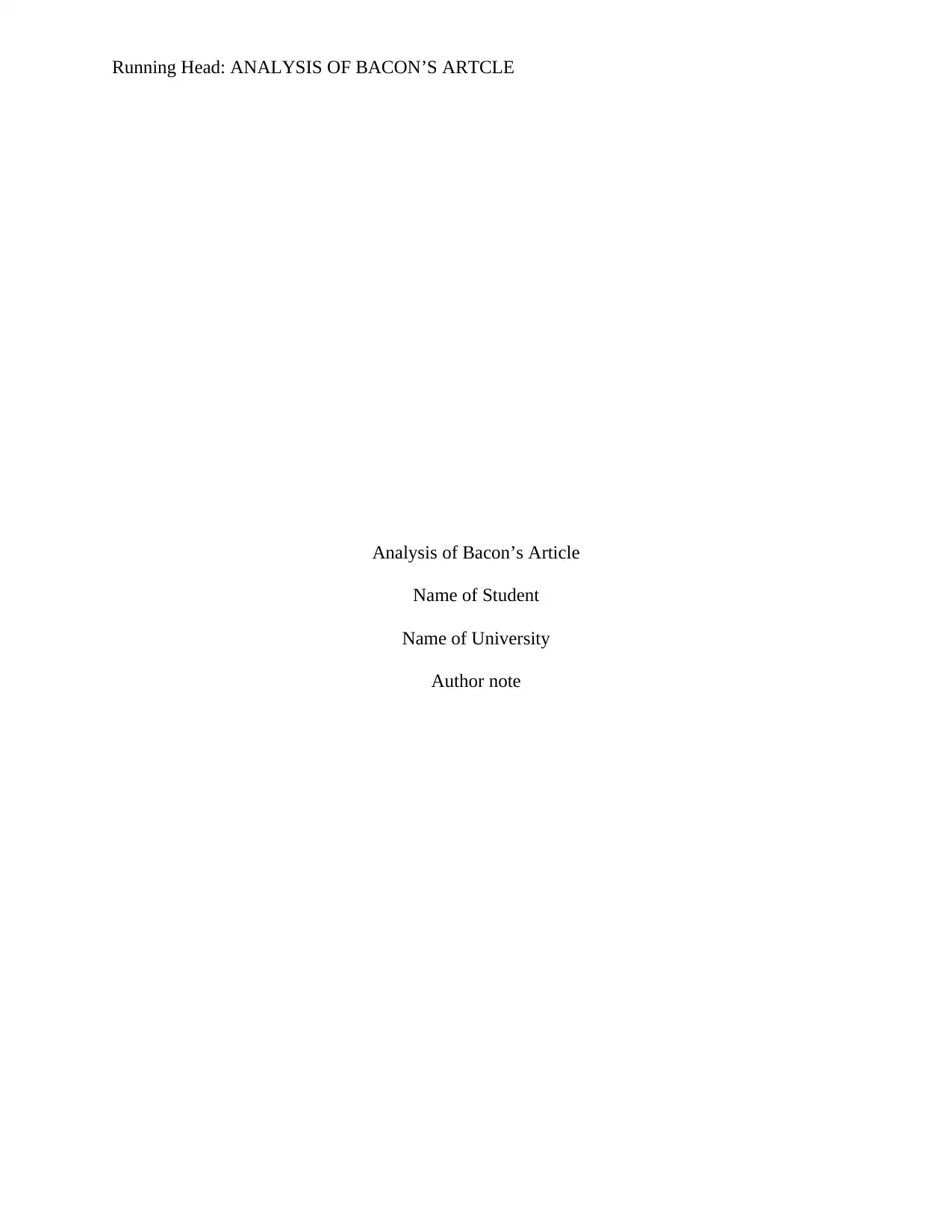
Running Head: ANALYSIS OF BACON’S ARTCLE
Analysis of Bacon’s Article
Name of Student
Name of University
Author note
Analysis of Bacon’s Article
Name of Student
Name of University
Author note
Paraphrase This Document
Need a fresh take? Get an instant paraphrase of this document with our AI Paraphraser
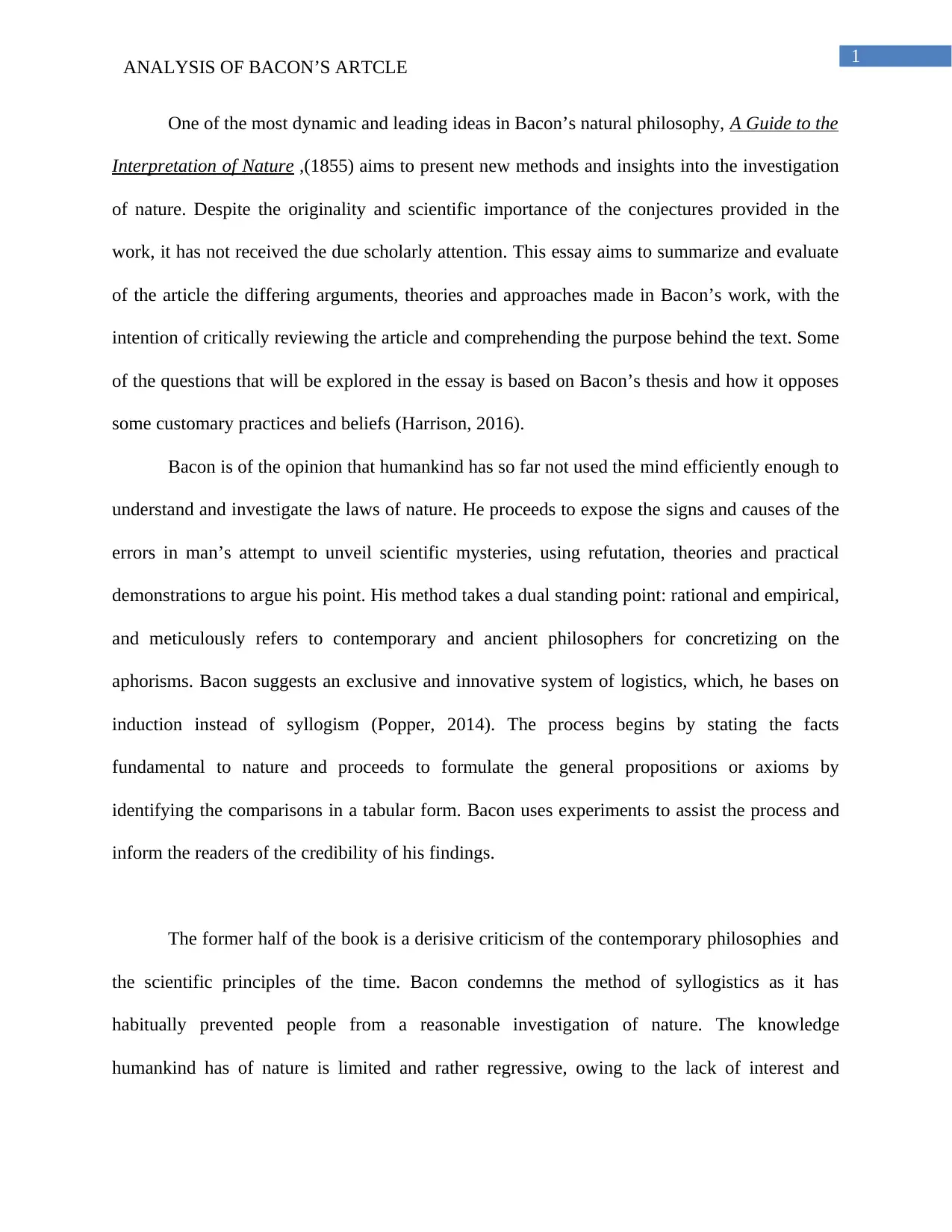
1
ANALYSIS OF BACON’S ARTCLE
One of the most dynamic and leading ideas in Bacon’s natural philosophy, A Guide to the
Interpretation of Nature ,(1855) aims to present new methods and insights into the investigation
of nature. Despite the originality and scientific importance of the conjectures provided in the
work, it has not received the due scholarly attention. This essay aims to summarize and evaluate
of the article the differing arguments, theories and approaches made in Bacon’s work, with the
intention of critically reviewing the article and comprehending the purpose behind the text. Some
of the questions that will be explored in the essay is based on Bacon’s thesis and how it opposes
some customary practices and beliefs (Harrison, 2016).
Bacon is of the opinion that humankind has so far not used the mind efficiently enough to
understand and investigate the laws of nature. He proceeds to expose the signs and causes of the
errors in man’s attempt to unveil scientific mysteries, using refutation, theories and practical
demonstrations to argue his point. His method takes a dual standing point: rational and empirical,
and meticulously refers to contemporary and ancient philosophers for concretizing on the
aphorisms. Bacon suggests an exclusive and innovative system of logistics, which, he bases on
induction instead of syllogism (Popper, 2014). The process begins by stating the facts
fundamental to nature and proceeds to formulate the general propositions or axioms by
identifying the comparisons in a tabular form. Bacon uses experiments to assist the process and
inform the readers of the credibility of his findings.
The former half of the book is a derisive criticism of the contemporary philosophies and
the scientific principles of the time. Bacon condemns the method of syllogistics as it has
habitually prevented people from a reasonable investigation of nature. The knowledge
humankind has of nature is limited and rather regressive, owing to the lack of interest and
ANALYSIS OF BACON’S ARTCLE
One of the most dynamic and leading ideas in Bacon’s natural philosophy, A Guide to the
Interpretation of Nature ,(1855) aims to present new methods and insights into the investigation
of nature. Despite the originality and scientific importance of the conjectures provided in the
work, it has not received the due scholarly attention. This essay aims to summarize and evaluate
of the article the differing arguments, theories and approaches made in Bacon’s work, with the
intention of critically reviewing the article and comprehending the purpose behind the text. Some
of the questions that will be explored in the essay is based on Bacon’s thesis and how it opposes
some customary practices and beliefs (Harrison, 2016).
Bacon is of the opinion that humankind has so far not used the mind efficiently enough to
understand and investigate the laws of nature. He proceeds to expose the signs and causes of the
errors in man’s attempt to unveil scientific mysteries, using refutation, theories and practical
demonstrations to argue his point. His method takes a dual standing point: rational and empirical,
and meticulously refers to contemporary and ancient philosophers for concretizing on the
aphorisms. Bacon suggests an exclusive and innovative system of logistics, which, he bases on
induction instead of syllogism (Popper, 2014). The process begins by stating the facts
fundamental to nature and proceeds to formulate the general propositions or axioms by
identifying the comparisons in a tabular form. Bacon uses experiments to assist the process and
inform the readers of the credibility of his findings.
The former half of the book is a derisive criticism of the contemporary philosophies and
the scientific principles of the time. Bacon condemns the method of syllogistics as it has
habitually prevented people from a reasonable investigation of nature. The knowledge
humankind has of nature is limited and rather regressive, owing to the lack of interest and
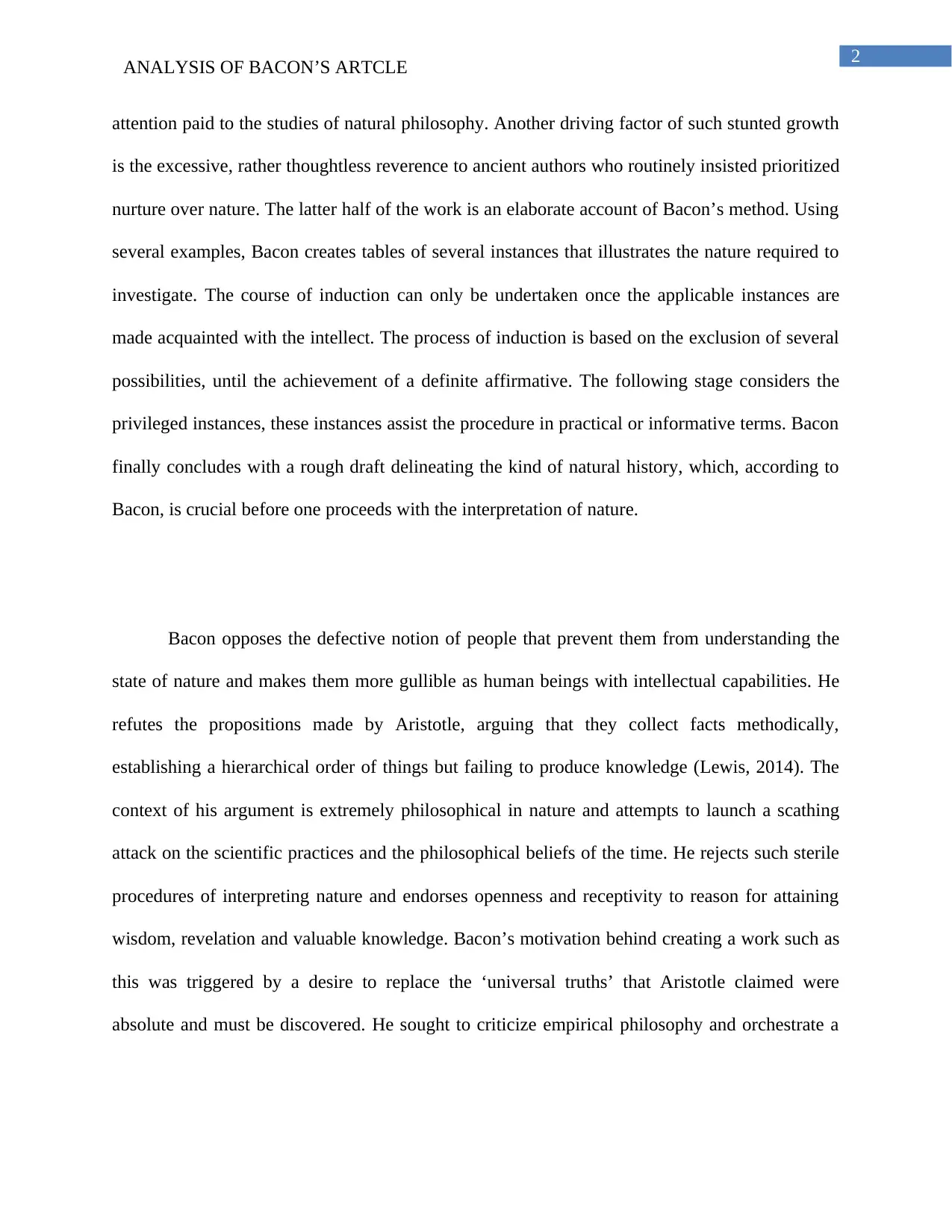
2
ANALYSIS OF BACON’S ARTCLE
attention paid to the studies of natural philosophy. Another driving factor of such stunted growth
is the excessive, rather thoughtless reverence to ancient authors who routinely insisted prioritized
nurture over nature. The latter half of the work is an elaborate account of Bacon’s method. Using
several examples, Bacon creates tables of several instances that illustrates the nature required to
investigate. The course of induction can only be undertaken once the applicable instances are
made acquainted with the intellect. The process of induction is based on the exclusion of several
possibilities, until the achievement of a definite affirmative. The following stage considers the
privileged instances, these instances assist the procedure in practical or informative terms. Bacon
finally concludes with a rough draft delineating the kind of natural history, which, according to
Bacon, is crucial before one proceeds with the interpretation of nature.
Bacon opposes the defective notion of people that prevent them from understanding the
state of nature and makes them more gullible as human beings with intellectual capabilities. He
refutes the propositions made by Aristotle, arguing that they collect facts methodically,
establishing a hierarchical order of things but failing to produce knowledge (Lewis, 2014). The
context of his argument is extremely philosophical in nature and attempts to launch a scathing
attack on the scientific practices and the philosophical beliefs of the time. He rejects such sterile
procedures of interpreting nature and endorses openness and receptivity to reason for attaining
wisdom, revelation and valuable knowledge. Bacon’s motivation behind creating a work such as
this was triggered by a desire to replace the ‘universal truths’ that Aristotle claimed were
absolute and must be discovered. He sought to criticize empirical philosophy and orchestrate a
ANALYSIS OF BACON’S ARTCLE
attention paid to the studies of natural philosophy. Another driving factor of such stunted growth
is the excessive, rather thoughtless reverence to ancient authors who routinely insisted prioritized
nurture over nature. The latter half of the work is an elaborate account of Bacon’s method. Using
several examples, Bacon creates tables of several instances that illustrates the nature required to
investigate. The course of induction can only be undertaken once the applicable instances are
made acquainted with the intellect. The process of induction is based on the exclusion of several
possibilities, until the achievement of a definite affirmative. The following stage considers the
privileged instances, these instances assist the procedure in practical or informative terms. Bacon
finally concludes with a rough draft delineating the kind of natural history, which, according to
Bacon, is crucial before one proceeds with the interpretation of nature.
Bacon opposes the defective notion of people that prevent them from understanding the
state of nature and makes them more gullible as human beings with intellectual capabilities. He
refutes the propositions made by Aristotle, arguing that they collect facts methodically,
establishing a hierarchical order of things but failing to produce knowledge (Lewis, 2014). The
context of his argument is extremely philosophical in nature and attempts to launch a scathing
attack on the scientific practices and the philosophical beliefs of the time. He rejects such sterile
procedures of interpreting nature and endorses openness and receptivity to reason for attaining
wisdom, revelation and valuable knowledge. Bacon’s motivation behind creating a work such as
this was triggered by a desire to replace the ‘universal truths’ that Aristotle claimed were
absolute and must be discovered. He sought to criticize empirical philosophy and orchestrate a
⊘ This is a preview!⊘
Do you want full access?
Subscribe today to unlock all pages.

Trusted by 1+ million students worldwide
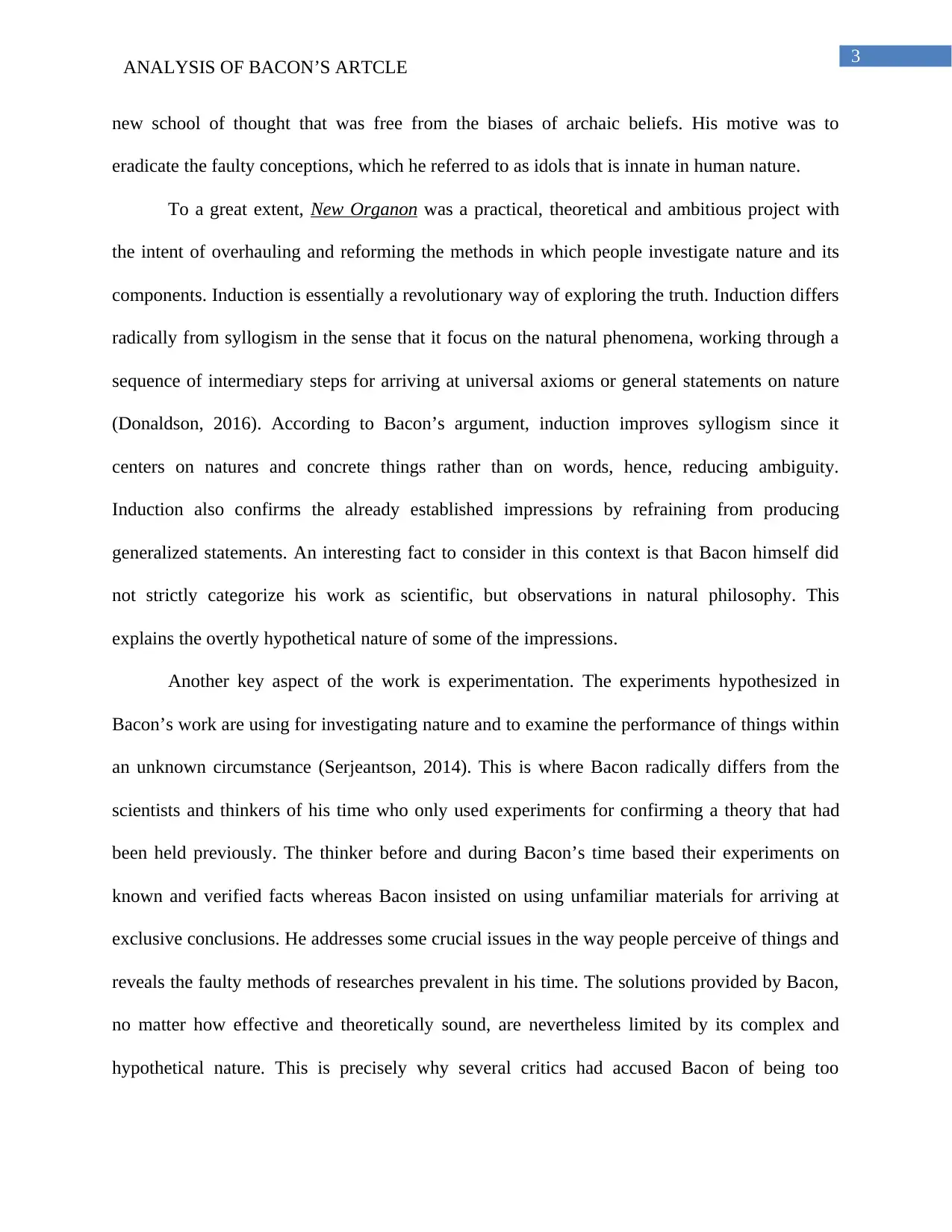
3
ANALYSIS OF BACON’S ARTCLE
new school of thought that was free from the biases of archaic beliefs. His motive was to
eradicate the faulty conceptions, which he referred to as idols that is innate in human nature.
To a great extent, New Organon was a practical, theoretical and ambitious project with
the intent of overhauling and reforming the methods in which people investigate nature and its
components. Induction is essentially a revolutionary way of exploring the truth. Induction differs
radically from syllogism in the sense that it focus on the natural phenomena, working through a
sequence of intermediary steps for arriving at universal axioms or general statements on nature
(Donaldson, 2016). According to Bacon’s argument, induction improves syllogism since it
centers on natures and concrete things rather than on words, hence, reducing ambiguity.
Induction also confirms the already established impressions by refraining from producing
generalized statements. An interesting fact to consider in this context is that Bacon himself did
not strictly categorize his work as scientific, but observations in natural philosophy. This
explains the overtly hypothetical nature of some of the impressions.
Another key aspect of the work is experimentation. The experiments hypothesized in
Bacon’s work are using for investigating nature and to examine the performance of things within
an unknown circumstance (Serjeantson, 2014). This is where Bacon radically differs from the
scientists and thinkers of his time who only used experiments for confirming a theory that had
been held previously. The thinker before and during Bacon’s time based their experiments on
known and verified facts whereas Bacon insisted on using unfamiliar materials for arriving at
exclusive conclusions. He addresses some crucial issues in the way people perceive of things and
reveals the faulty methods of researches prevalent in his time. The solutions provided by Bacon,
no matter how effective and theoretically sound, are nevertheless limited by its complex and
hypothetical nature. This is precisely why several critics had accused Bacon of being too
ANALYSIS OF BACON’S ARTCLE
new school of thought that was free from the biases of archaic beliefs. His motive was to
eradicate the faulty conceptions, which he referred to as idols that is innate in human nature.
To a great extent, New Organon was a practical, theoretical and ambitious project with
the intent of overhauling and reforming the methods in which people investigate nature and its
components. Induction is essentially a revolutionary way of exploring the truth. Induction differs
radically from syllogism in the sense that it focus on the natural phenomena, working through a
sequence of intermediary steps for arriving at universal axioms or general statements on nature
(Donaldson, 2016). According to Bacon’s argument, induction improves syllogism since it
centers on natures and concrete things rather than on words, hence, reducing ambiguity.
Induction also confirms the already established impressions by refraining from producing
generalized statements. An interesting fact to consider in this context is that Bacon himself did
not strictly categorize his work as scientific, but observations in natural philosophy. This
explains the overtly hypothetical nature of some of the impressions.
Another key aspect of the work is experimentation. The experiments hypothesized in
Bacon’s work are using for investigating nature and to examine the performance of things within
an unknown circumstance (Serjeantson, 2014). This is where Bacon radically differs from the
scientists and thinkers of his time who only used experiments for confirming a theory that had
been held previously. The thinker before and during Bacon’s time based their experiments on
known and verified facts whereas Bacon insisted on using unfamiliar materials for arriving at
exclusive conclusions. He addresses some crucial issues in the way people perceive of things and
reveals the faulty methods of researches prevalent in his time. The solutions provided by Bacon,
no matter how effective and theoretically sound, are nevertheless limited by its complex and
hypothetical nature. This is precisely why several critics had accused Bacon of being too
Paraphrase This Document
Need a fresh take? Get an instant paraphrase of this document with our AI Paraphraser
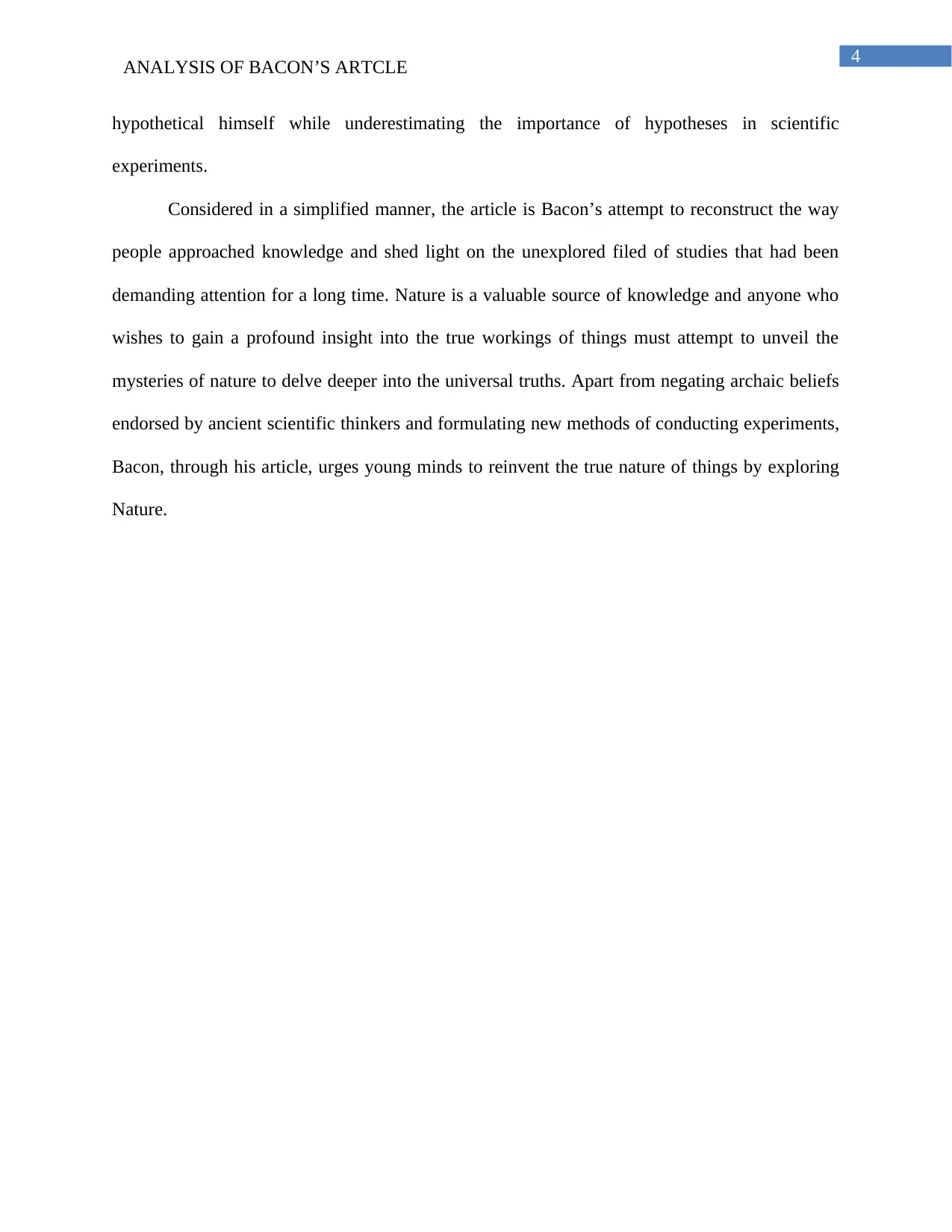
4
ANALYSIS OF BACON’S ARTCLE
hypothetical himself while underestimating the importance of hypotheses in scientific
experiments.
Considered in a simplified manner, the article is Bacon’s attempt to reconstruct the way
people approached knowledge and shed light on the unexplored filed of studies that had been
demanding attention for a long time. Nature is a valuable source of knowledge and anyone who
wishes to gain a profound insight into the true workings of things must attempt to unveil the
mysteries of nature to delve deeper into the universal truths. Apart from negating archaic beliefs
endorsed by ancient scientific thinkers and formulating new methods of conducting experiments,
Bacon, through his article, urges young minds to reinvent the true nature of things by exploring
Nature.
ANALYSIS OF BACON’S ARTCLE
hypothetical himself while underestimating the importance of hypotheses in scientific
experiments.
Considered in a simplified manner, the article is Bacon’s attempt to reconstruct the way
people approached knowledge and shed light on the unexplored filed of studies that had been
demanding attention for a long time. Nature is a valuable source of knowledge and anyone who
wishes to gain a profound insight into the true workings of things must attempt to unveil the
mysteries of nature to delve deeper into the universal truths. Apart from negating archaic beliefs
endorsed by ancient scientific thinkers and formulating new methods of conducting experiments,
Bacon, through his article, urges young minds to reinvent the true nature of things by exploring
Nature.
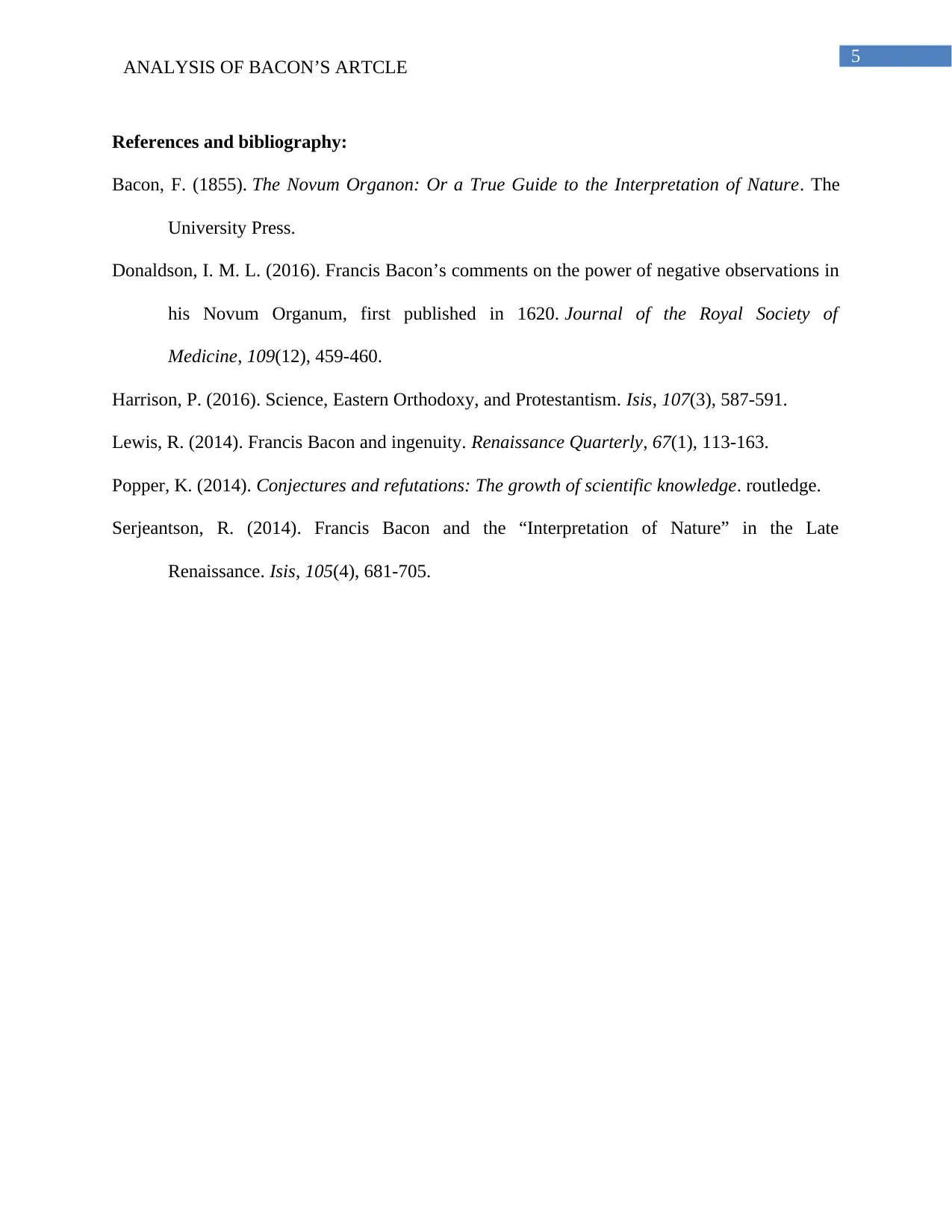
5
ANALYSIS OF BACON’S ARTCLE
References and bibliography:
Bacon, F. (1855). The Novum Organon: Or a True Guide to the Interpretation of Nature. The
University Press.
Donaldson, I. M. L. (2016). Francis Bacon’s comments on the power of negative observations in
his Novum Organum, first published in 1620. Journal of the Royal Society of
Medicine, 109(12), 459-460.
Harrison, P. (2016). Science, Eastern Orthodoxy, and Protestantism. Isis, 107(3), 587-591.
Lewis, R. (2014). Francis Bacon and ingenuity. Renaissance Quarterly, 67(1), 113-163.
Popper, K. (2014). Conjectures and refutations: The growth of scientific knowledge. routledge.
Serjeantson, R. (2014). Francis Bacon and the “Interpretation of Nature” in the Late
Renaissance. Isis, 105(4), 681-705.
ANALYSIS OF BACON’S ARTCLE
References and bibliography:
Bacon, F. (1855). The Novum Organon: Or a True Guide to the Interpretation of Nature. The
University Press.
Donaldson, I. M. L. (2016). Francis Bacon’s comments on the power of negative observations in
his Novum Organum, first published in 1620. Journal of the Royal Society of
Medicine, 109(12), 459-460.
Harrison, P. (2016). Science, Eastern Orthodoxy, and Protestantism. Isis, 107(3), 587-591.
Lewis, R. (2014). Francis Bacon and ingenuity. Renaissance Quarterly, 67(1), 113-163.
Popper, K. (2014). Conjectures and refutations: The growth of scientific knowledge. routledge.
Serjeantson, R. (2014). Francis Bacon and the “Interpretation of Nature” in the Late
Renaissance. Isis, 105(4), 681-705.
⊘ This is a preview!⊘
Do you want full access?
Subscribe today to unlock all pages.

Trusted by 1+ million students worldwide
1 out of 6
Your All-in-One AI-Powered Toolkit for Academic Success.
+13062052269
info@desklib.com
Available 24*7 on WhatsApp / Email
![[object Object]](/_next/static/media/star-bottom.7253800d.svg)
Unlock your academic potential
Copyright © 2020–2026 A2Z Services. All Rights Reserved. Developed and managed by ZUCOL.